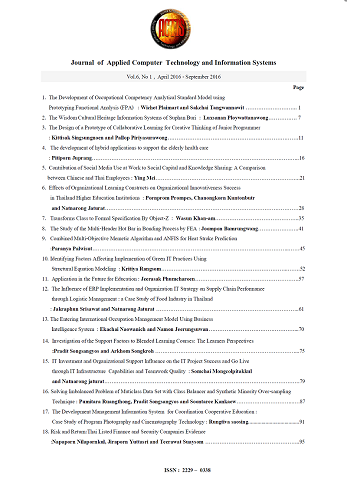The Influence of ERP Implementation and Organization IT Strategy on Supply Chain Performance through Logistic Management : a Case Study of Food Industry in Thailand
Main Article Content
Abstract
Industries give importance to the Enterprise Resource Planning (ERP) system applying in the organizational management for the utmost effectiveness in the operation. This is to reduce the overlapping of a lot of information in each department and help in the resources management and cut off the unnecessary cost that will lead to the organizational benefits in the long run. ERP implementation and Organization IT strategy in the food supply chain shall be integrated for the best effective use. The objectives of this research were to study on the impact of ERP implementation and Organization IT strategy over the Supply Chain Management Performance.
The attitude rating of ERP implementation and Organization IT strategy was used as the independent variable whereas the logistic management was the mediator variable and the dependent variable here was the supply chain management performance. There were 325 sample firms from IT leaders or IT professionals represented for the medium and large sizes of food industry in Thailand. The data as gathered from the researcher were analyzed using SEM for the model’s validity and reliability determination. A structure equation model was placed here for the hypothesized model test and to assess for the total fit. It was confirmed by the results of the study the significant support from the goodness of fit and regression weight to every of hypotheses.
From the hypotheses testing, ERP implementation was found without the direct positive relationship with the performance of supply chain and Organization IT strategy was found the direct positive relationship with the performance of supply chain, In addition, it also presented the equally indirect positive relationship with the logistic management in which indicated that the firm shall implementation ERP and Organizational IT strategy when having good logistic management. This showed that ERP implementation and Organizational IT strategy did not have any direct effect on the supply chain management but must go through mediator respectively.
อุตสาหกรรมให้ความสำคัญต่อการดำเนินงานโดย ระบบ ERP เพื่อประยุกต์ใช้ในการบริหารจัดการองค์กรในการ เพิ่มประสิทธิภาพให้เกิดประโยชน์สูงสุดในการดำเนินงาน และ เป็นการลดความซับซ้อนของข้อมูลจำนวนมากของแต่ละแผนก รวมไปถึงการตัดค่าใช้จ่ายที่ไม่จำเป็นซึ่งจะนำไปสู่ผลประโยชน์ ระยะยาวขององค์กร การดำเนินงานโดยระบบ ERP และการ วางกลยุทธ์ทางด้านสารสนเทศ จะต้องมีการบูรณาการเพื่อ สาหรับใช้งานให้มีประสิทธิภาพสูงสุดในการวิจัยครั้งนี้มี วัตถุประสงค์ที่จะศึกษาเกี่ยวกับผลกระทบของการดำเนินงาน โดยระบบ ERP และการดeเนินกลยุทธ์ขององค์กรทางด้าน สารสนเทศบนประสิทธิภาพของห่วงโซ่อุปทาน
ผลการวิจัยเกิดจากการให้คะแนนจากทัศนคติที่เกิดจาก การใช้ระบบ ERP และการวางกลยุทธ์ทางด้านสารสนเทศของ องค์กรโดยใช้เป็นตัวแปรอิสระ โดยผ่านตัวแปรกลางคือการ บริหารจัดการด้านโลจิสติกส์ ส่วนตัวแปรตามคือประสิทธิภาพ ของห่วงโซ่อุปทาน โดยใช้กลุ่มตัวอย่างคือกลุ่มอุตสาหกรรม อาหารในประเทศไทย ที่มีขนาดกลาง และขนาดใหญ่ จานวน 325 บริษัท ตอบแบบสอบถามโดยตัวแทนที่เป็นผู้เชี่ยวชาญ ทางด้านไอทีของแต่ละบริษัท หลังจากนั้นนำข้อมูลที่รวบรวมได้มาทำการวิเคราะห์โดยใช้ SEM สำหรับตรวจสอบรูปแบบของความถูกต้องและความน่าเชื่อถือจากสมการโครงสร้างที่ถูกวางไว้เพื่อทดสอบรูปแบบของสมมุติฐานที่ได้วางไว้และผ่านเกณฑ์ด้านความสอดคล้องของข้อมูลเชิงประจักษ์รวมไปถึงสนับสนุนยืนยันผลของการศึกษาอย่างมีนัยยะสำคัญจากความสอดคล้องของน้ำหนักในสมการเชิงถดถอยในทุกสมมุตฐาน
จากการทดสอบสมมุติฐานพบว่าการดาเนินงานโดย ERP ไม่มีความสัมพันธ์เชิงบวกต่อประสิทธิภาพของห่วงโซ่ อุปทานและการวางกลยุทธ์ทางด้านสารสนเทศในองค์กรพบว่า มีความสัมพันธ์เชิงบวกต่อประสิทธิภาพของห่วงโซ่อุปทาน นอกจากนั้นยังแสดงถึงความสัมพันธ์เชิงบวกทางอ้อมอย่างเท่าเทียมโดยผ่านการจัดการด้านโลจิสติกส์ ซึ่งชี้ให้เห็นว่าบริษัทที่ ใช้ ERP ไม่ได้มีผลกระทบทางตรงใด ๆ ต่อประสิทธิภาพของ ห่วงโซ่อุปทานแต่มีผลกระทบทางอ้อม โดยผ่านตัวแปรกลาง คือโลจิสติกส์ และในส่วนของการวางกลยุทธ์ด้านสารสนเทศ ในองค์กรนั้นมีผลกระทบทั้งทางตรง และทางอ้อมต่อ ประสิทธิภาพของห่วงโซ่อุปทาน โดยผ่านตัวแปรกลาง
Article Details
It is the policy of ACTISNU to own the copyright to the published contributions on behalf of the interests of ACTISNU, its authors, and their employers, and to facilitate the appropriate reuse of this material by others. To comply with the Copyright Law, authors are required to sign an ACTISNU copyright transfer form before publication. This form, a copy of which appears in this journal (or website), returns to authors and their employers full rights to reuse their material for their own purposes.

